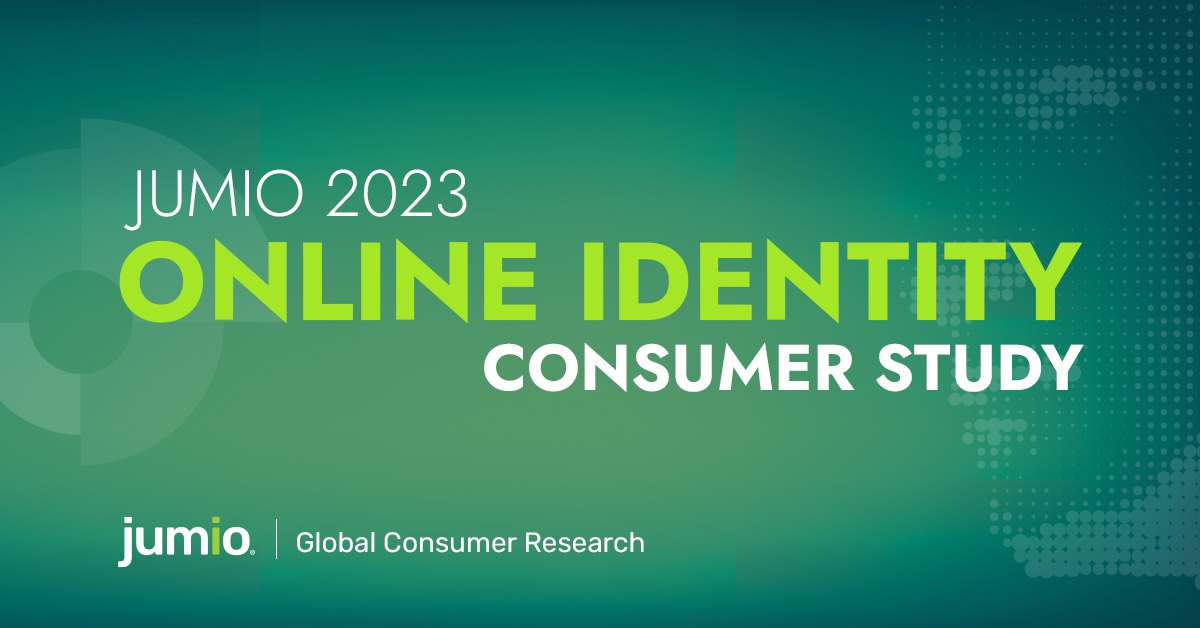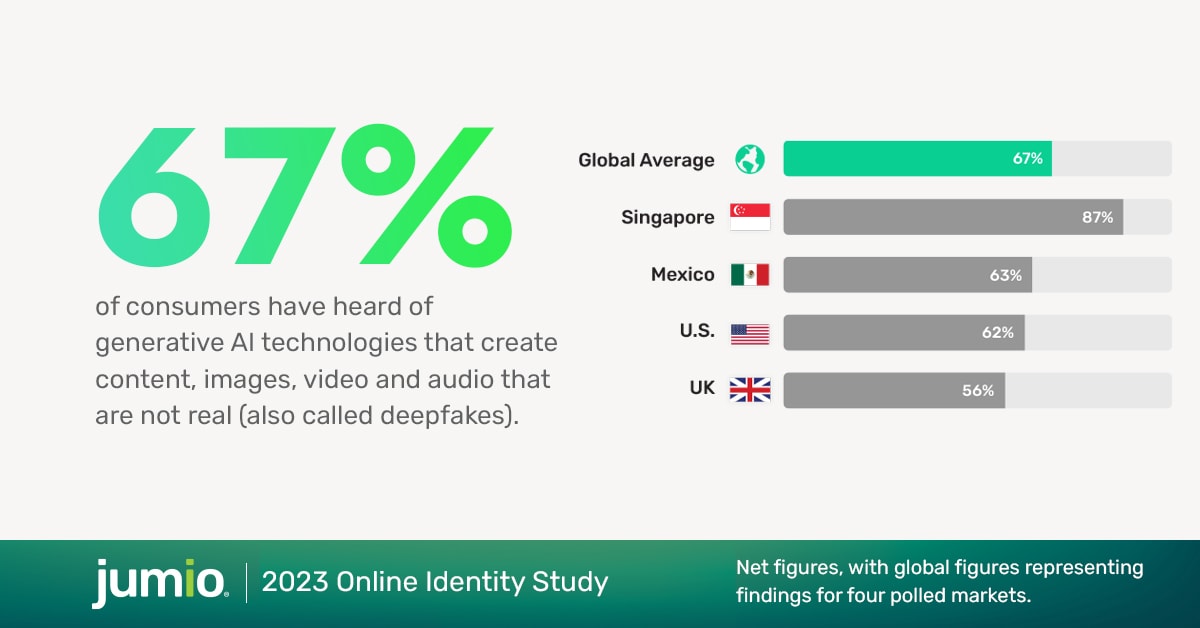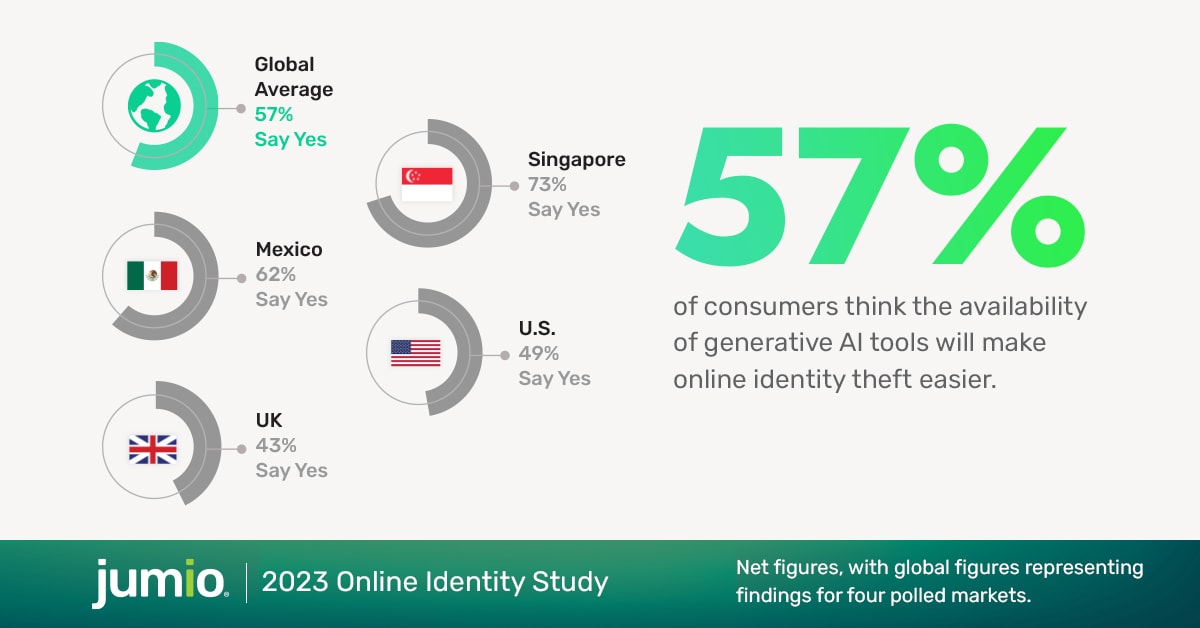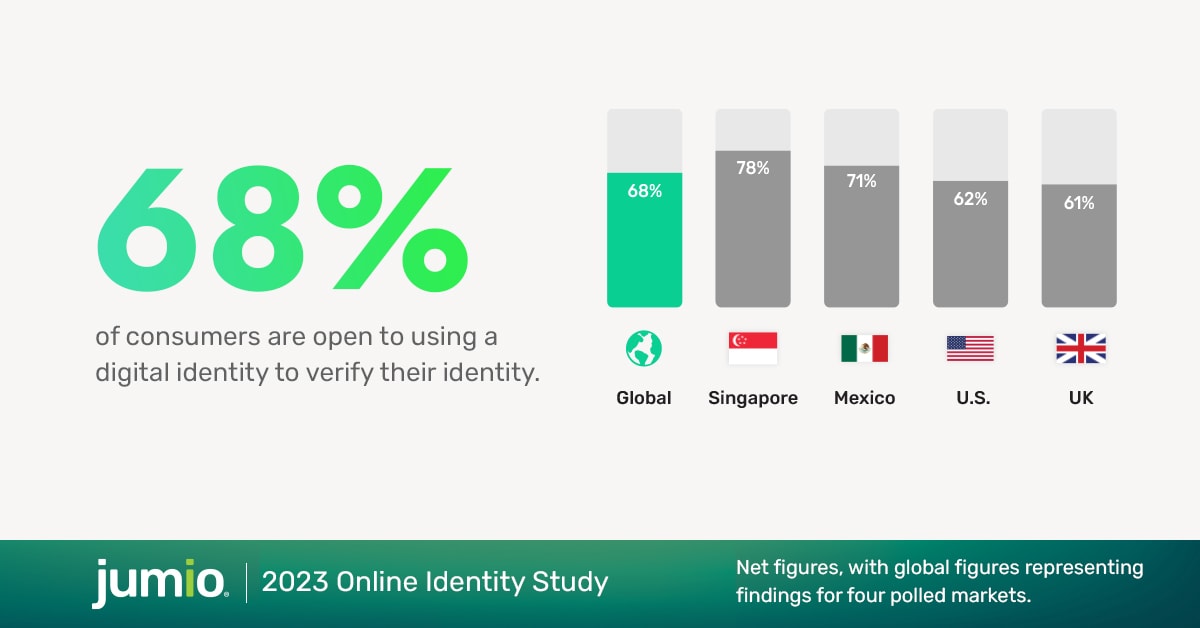
New global research from Jumio reveals disconnect between consumer awareness of generative AI and deepfakes and the risk these technologies pose to online security
Jumio, the leading provider of automated, end-to-end identity proofing, risk assessment and compliance solutions, today released the Jumio 2023 Online Identity Study, the second installment of its annual global consumer research, conducted by Censuswide. This year’s results highlight an understanding among consumers around how generative AI and deepfake technologies could accelerate identity fraud, and the subsequent need for digital identities for online verification and authentication. But consumers also appear to overestimate their ability to spot deepfakes, which can render them even more vulnerable to attack.
The study examined 8,055 adult consumers split evenly across the United Kingdom, United States, Singapore and Mexico. Over two-thirds (67%) say they are aware of generative AI tools – such as ChatGPT, DALL-E and Lensa AI – which can produce fabricated content, including videos, images and audio. Awareness was highest among consumers in Singapore (87%) and lowest among those in the UK (56%).

An underestimation of the sophistication of the technologies
Awareness of generative AI and deepfakes among consumers is high — 52% of respondents believe they could detect a deepfake video. This sentiment reflects over-confidence on the part of consumers, given the reality that deepfakes have reached a level of sophistication that prevents detection by the naked eye.
This is concerning given that recent figures from UK Finance found that impersonation scams cost the UK £177 million in 2022. The research specifically called out how this has been driven by scams becoming harder to spot as warning signs, such as typos or fake-looking websites, are less prevalent due to the use of generative AI tools. In the U.S., consumers lost $2.6 billion to impersonation scams in 2022, up from $2.4 billion in 2021, according to the Federal Trade Commission.
Jumio data also shows a steady uptick in the use of increasingly sophisticated deepfakes across the globe and across industries, with a heavier presence in the payments and crypto sectors.
“A lot of people seem to think they can spot a deepfake. While there are certainly tell-tale signs to look for, deepfakes are getting exponentially better all the time and are becoming increasingly difficult to detect without the aid of AI,” said Stuart Wells, Jumio’s chief technology officer. “While AI-powered technology will increasingly be required by businesses to spot and protect their networks and customers from deepfakes, consumers can protect themselves by treating provocative images, videos and audio with skepticism. Some quick research will usually uncover whether it’s a fake or not.”
Awareness shifts to understanding of potential harmful use
As consumers become more aware of these technologies, there is also an emerging understanding of how they could be used to fuel identity theft. Over half (57%) believe that online identity theft will become easier as a result, and consumers in Singapore showed the highest level of understanding of their potential harmful use (73%). These levels decrease among consumers in Mexico (62%), the U.S. (49%) and the UK (43%).

The onus is on businesses to educate and better protect
“Organizations have a duty to educate their customers on the nuances of generative AI technologies to help them develop more realistic expectations of their ability to detect deepfakes,” said Philipp Pointner, Jumio’s chief of digital identity. “At the same time, even the best education will never be able to completely stop a fraudster’s use of evolving technologies. Online organizations must look to implement multimodal, biometric-based verification systems that can detect deepfakes and prevent stolen personal information from being used. Encouragingly, our research indicated strong consumer appetite for this form of identity verification, which businesses should act on fast.”
The survey found that over two-thirds (68%) of consumers are open to using a digital identity to verify themselves online. The top sectors where they would prefer a digital identity over a physical ID (like a driver’s license or passport) are financial services (43%), government (38%) and healthcare (35%).

Find additional data and insights here.
The research was conducted by Censuswide, with 8,055 consumers split evenly across the United Kingdom, United States, Singapore and Mexico. The fieldwork took place April 4-6, 2023. Censuswide abides by and employs members of the Market Research Society which is based on the ESOMAR principles.
About Jumio
Jumio helps you to know and trust your customers online. From account opening to ongoing monitoring, the Jumio KYX Platform provides advanced identity proofing, risk assessment and compliance solutions to accurately establish, maintain and reassert trust.
Leveraging advanced technology including automation, biometrics, AI/machine learning, liveness detection and no-code orchestration with hundreds of data sources, Jumio helps organizations fight fraud and financial crime, onboard good customers faster and meet regulatory compliance including KYC and AML. Jumio has processed more than 1 billion transactions spanning over 200 countries and territories from real-time web and mobile transactions.
Based in Sunnyvale, California, Jumio operates globally with offices and representation in North America, Latin America, Europe, Asia Pacific and the Middle East and has been the recipient of numerous awards for innovation. Jumio is backed by Centana Growth Partners, Great Hill Partners and Millennium Technology Value Partners.
For more information, please visit jumio.com.
Contacts
U.S. Media Contact
Elena Philippou
10Fold Communications
[email protected]
925-639-0409
Europe Media Contact
Gemma Lingham
FleishmanHillard UK
[email protected]
+44-752-569-9347
APAC Media Contact
Luke Nazir
FINN Partners
[email protected]
+65 8139 2504
LATAM Media Contact
Karina Durán
Nasci Comunicación
[email protected]
+52 55 5139 5482
